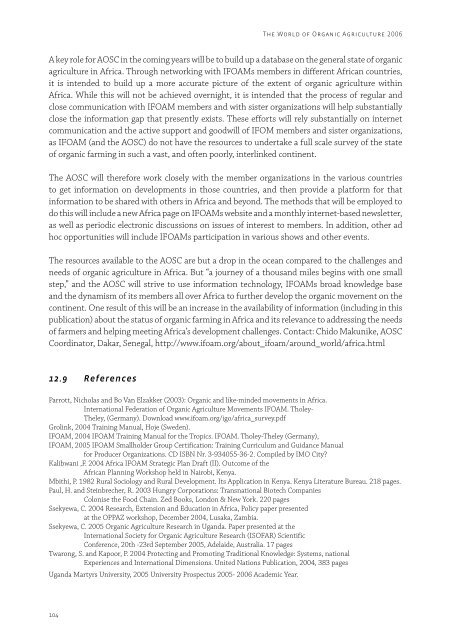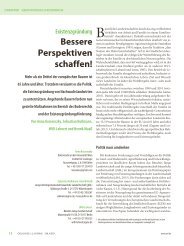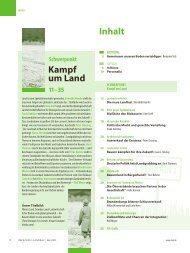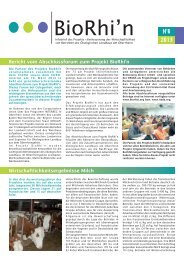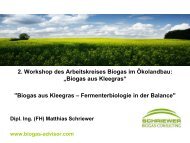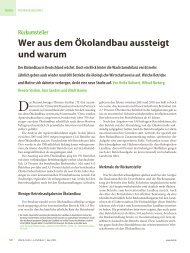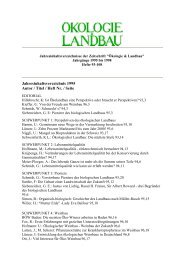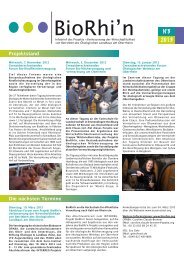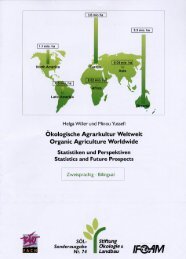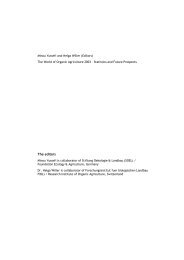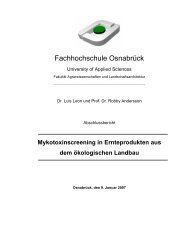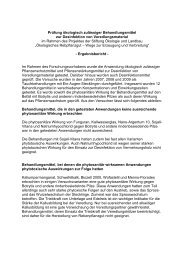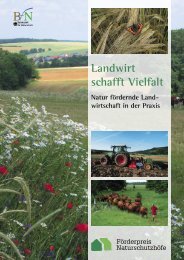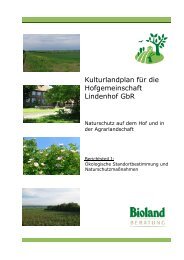the world of organic agriculture - Organic Eprints
the world of organic agriculture - Organic Eprints
the world of organic agriculture - Organic Eprints
Create successful ePaper yourself
Turn your PDF publications into a flip-book with our unique Google optimized e-Paper software.
104<br />
The World <strong>of</strong> <strong>Organic</strong> Agriculture 2006<br />
A key role for AOSC in <strong>the</strong> coming years will be to build up a database on <strong>the</strong> general state <strong>of</strong> <strong>organic</strong><br />
<strong>agriculture</strong> in Africa. Through networking with IFOAMs members in different African countries,<br />
it is intended to build up a more accurate picture <strong>of</strong> <strong>the</strong> extent <strong>of</strong> <strong>organic</strong> <strong>agriculture</strong> within<br />
Africa. While this will not be achieved overnight, it is intended that <strong>the</strong> process <strong>of</strong> regular and<br />
close communication with IFOAM members and with sister organizations will help substantially<br />
close <strong>the</strong> information gap that presently exists. These efforts will rely substantially on internet<br />
communication and <strong>the</strong> active support and goodwill <strong>of</strong> IFOM members and sister organizations,<br />
as IFOAM (and <strong>the</strong> AOSC) do not have <strong>the</strong> resources to undertake a full scale survey <strong>of</strong> <strong>the</strong> state<br />
<strong>of</strong> <strong>organic</strong> farming in such a vast, and <strong>of</strong>ten poorly, interlinked continent.<br />
The AOSC will <strong>the</strong>refore work closely with <strong>the</strong> member organizations in <strong>the</strong> various countries<br />
to get information on developments in those countries, and <strong>the</strong>n provide a platform for that<br />
information to be shared with o<strong>the</strong>rs in Africa and beyond. The methods that will be employed to<br />
do this will include a new Africa page on IFOAMs website and a monthly internet-based newsletter,<br />
as well as periodic electronic discussions on issues <strong>of</strong> interest to members. In addition, o<strong>the</strong>r ad<br />
hoc opportunities will include IFOAMs participation in various shows and o<strong>the</strong>r events.<br />
The resources available to <strong>the</strong> AOSC are but a drop in <strong>the</strong> ocean compared to <strong>the</strong> challenges and<br />
needs <strong>of</strong> <strong>organic</strong> <strong>agriculture</strong> in Africa. But “a journey <strong>of</strong> a thousand miles begins with one small<br />
step,” and <strong>the</strong> AOSC will strive to use information technology, IFOAMs broad knowledge base<br />
and <strong>the</strong> dynamism <strong>of</strong> its members all over Africa to fur<strong>the</strong>r develop <strong>the</strong> <strong>organic</strong> movement on <strong>the</strong><br />
continent. One result <strong>of</strong> this will be an increase in <strong>the</strong> availability <strong>of</strong> information (including in this<br />
publication) about <strong>the</strong> status <strong>of</strong> <strong>organic</strong> farming in Africa and its relevance to addressing <strong>the</strong> needs<br />
<strong>of</strong> farmers and helping meeting Africa’s development challenges. Contact: Chido Makunike, AOSC<br />
Coordinator, Dakar, Senegal, http://www.ifoam.org/about_ifoam/around_<strong>world</strong>/africa.html<br />
12.9 References<br />
Parrott, Nicholas and Bo Van Elzakker (2003): <strong>Organic</strong> and like-minded movements in Africa.<br />
International Federation <strong>of</strong> <strong>Organic</strong> Agriculture Movements IFOAM. Tholey-<br />
Theley, (Germany). Download www.ifoam.org/igo/africa_survey.pdf<br />
Grolink, 2004 Training Manual, Hoje (Sweden).<br />
IFOAM, 2004 IFOAM Training Manual for <strong>the</strong> Tropics. IFOAM. Tholey-Theley (Germany),<br />
IFOAM, 2005 IFOAM Smallholder Group Certification: Training Curriculum and Guidance Manual<br />
for Producer Organizations. CD ISBN Nr. 3-934055-36-2. Compiled by IMO City?<br />
Kalibwani ,F. 2004 Africa IFOAM Strategic Plan Draft (II). Outcome <strong>of</strong> <strong>the</strong><br />
African Planning Workshop held in Nairobi, Kenya.<br />
Mbithi, P. 1982 Rural Sociology and Rural Development. Its Application in Kenya. Kenya Literature Bureau. 218 pages.<br />
Paul, H. and Steinbrecher, R. 2003 Hungry Corporations: Transnational Biotech Companies<br />
Colonise <strong>the</strong> Food Chain. Zed Books, London & New York. 220 pages<br />
Ssekyewa, C. 2004 Research, Extension and Education in Africa, Policy paper presented<br />
at <strong>the</strong> OPPAZ workshop, December 2004, Lusaka, Zambia.<br />
Ssekyewa, C. 2005 <strong>Organic</strong> Agriculture Research in Uganda. Paper presented at <strong>the</strong><br />
International Society for <strong>Organic</strong> Agriculture Research (ISOFAR) Scientific<br />
Conference, 20th -23rd September 2005, Adelaide, Australia. 17 pages<br />
Twarong, S. and Kapoor, P. 2004 Protecting and Promoting Traditional Knowledge: Systems, national<br />
Experiences and International Dimensions. United Nations Publication, 2004, 383 pages<br />
Uganda Martyrs University, 2005 University Prospectus 2005- 2006 Academic Year.


